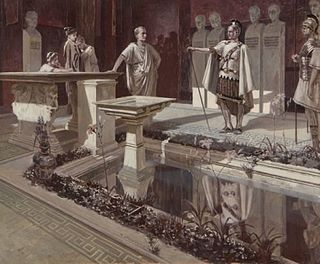Related Research Articles

The gens Petronia was a plebeian family at ancient Rome. This gens claimed an ancient lineage, as a Petronius Sabinus is mentioned in the time of Lucius Tarquinius Superbus, the last of the Roman kings, but few Petronii are mentioned in the time of the Republic. They are frequently encountered under the Empire, holding numerous consulships, and eventually obtaining the Empire itself during the brief reign of Petronius Maximus in AD 455.

Aulus Plautius was a Roman politician and general of the mid-1st century. He began the Roman conquest of Britain in 43, and became the first governor of the new province, serving from 43 to 46.
The gens Afrania was a plebeian family at Rome, which is first mentioned in the second century BC. The first member of this gens to achieve prominence was Gaius Afranius Stellio, who became praetor in 185 BC.
The gens Vitellia was a family of ancient Rome, which rose from obscurity in imperial times, and briefly held the Empire itself in AD 69. The first of this gens to obtain the consulship was Aulus Vitellius, uncle of the emperor Vitellius, in AD 32.
The gens Aternia, also written Aeternia, was a patrician family at ancient Rome. The only member of this gens to appear in history was Aulus Aternius Varus, consul in 454 BC, and later one of the only patricians ever to be chosen tribune of the plebs. Other Aternii are known from inscriptions.

Anicius Petronius Probus was a politician of the Western Roman Empire.
Anicia Faltonia Proba was a Roman noblewoman of the gens Anicia.
The gens Caecinia was a plebeian family of Etruscan origin at ancient Rome. Members of this gens are first mentioned in the time of Cicero, and they remained prominent through the first century of the Empire, before fading into obscurity in the time of the Flavian emperors. A family of this name rose to prominence once more at the beginning of the fifth century.
Publius Petronius was a Roman senator, who was active during the reigns of Caligula and Claudius. He was suffect consul in the second half of the year AD 19, replacing Lucius Norbanus Balbus. The sortition also awarded him the proconsulate of Asia; however, Petronius is best known as having appointed legatus or governor of Syria in AD 39, probably arriving in the country late in the year. A.A. Barrett lists him as an example of the "excellent appointments" made by an emperor often dismissed as mentally unbalanced.
Aulus Plautius was a Roman politician and senator who was appointed Suffect consul during the reign of Augustus.
The gens Coruncania was a plebeian family at ancient Rome. The first of the family to come to prominence was Tiberius Coruncanius, a novus homo who became consul in 280 BC, and dictator in 246.
The gens Ogulnia was an ancient plebeian family at ancient Rome. The gens first came to prominence at the beginning of the third century BC, when the brothers Quintus and Gnaeus Ogulnius, tribunes of the plebs, carried a law opening most of the Roman priesthoods to the plebeians. The only member of the family to obtain the consulship was Quintus Ogulnius Gallus in 269 BC. However, Ogulnii are still found in imperial times.
Aulus Bucius Lappius Maximus was a Roman senator who flourished during the Flavian dynasty; Brian W. Jones considers him one of Domitian's amici or advisors. He held the consulate twice.
The gens Peducaea, occasionally written Paeducaea or Peducea, was a plebeian family at ancient Rome. Members of this gens occur in history from the end of the second century BC, and from then to the time of Antoninus Pius, they steadily increased in prominence. The first of the Peducaii to obtain the consulship was Titus Peducaeus in 35 BC.
The gens Perperna, also found as Perpenna, was a plebeian family at ancient Rome. Members of this gens first appear in history during the second century BC, and Marcus Perperna obtained the consulship in 130 BC.
Gaius Petronius was a Roman senator, who was active during the Principate. He was suffect consul from September through December AD 25, succeeding Cossus Cornelius Lentulus. Bartolomeo Borghesi has argued that Gaius Petronius is the same person as Gaius Petronius Umbrinus, who is mentioned in an inscription from Rome as curator locorum publicorum iudicandorum; this is unlikely since all known Petronii in the first half of the first century belong to the branch of the Petronii lacking a cognomen.
The gens Sellia or Selia was an obscure plebeian family at ancient Rome. Members of this gens are mentioned in the time of Cicero, but none of them attained any of the higher offices of the Roman state.
The gens Septicia was an obscure plebeian family at ancient Rome. Hardly any members of this gens are mentioned in ancient writers, but a number are known from inscriptions. The most famous of the Septicii was Gaius Septicius Clarus, Prefect of the Praetorian Guard under the emperor Hadrian.
The gens Seria was a minor plebeian family at ancient Rome. Members of this gens rose to prominence during the second century, attaining the consulship twice, and holding various other offices under the Nerva-Antonine dynasty.
The gens Silia was a plebeian family at ancient Rome. Members of this gens are mentioned as early as the fifth century BC, but first to hold the consulship was Publius Silius Nerva, in the time of Augustus. The Silii remained prominent until the time of the Severan dynasty, in the early third century.
References
- ↑ Paul A. Gallivan, "Some Comments on the Fasti for the Reign of Nero", Classical Quarterly , 24 (1974), pp.
- ↑ CIL VI, 2041
- ↑ CIL VI, 916